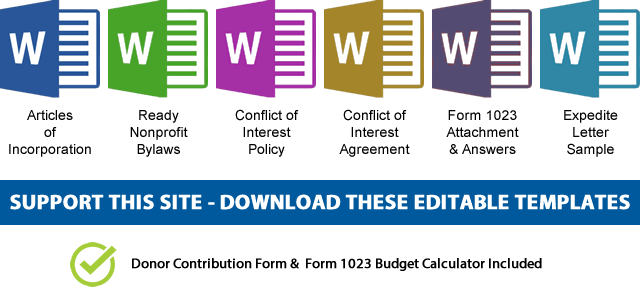Jeopardizing your nonprofit organization’s 501c3 Tax-Exempt Status
A 501c3 organization must engage in activities that accomplish exempt purposes or it jeopardizes its tax-exempt status and its eligibility to receive tax-deductible contributions.
Section 501c3 nonprofit organizations may not be used for the private benefit of any individual, nor may their earnings inure to the benefit of insiders. Moreover, a 501c3 organization may only engage in legislative activities to a limited extent, and is forbidden to engage in political activities. An organization will also lose its exempt status under section 501c3 if it operates for the primary purpose of carrying on an unrelated trade or business, which is discussed in detail on Unrelated Business Income Tax page.
Finally, an organization must meet its reporting obligations by filing Form 990, form 990-EZ, or Form 990-N, (e- Postcard), annually. Failure to comply could result in loss of exempt status. See the IRS Form 990 requirement page for detailed information on this requirement.
What is Private Benefit in nonprofit organizations?
An organization must serve a public interest to qualify for exemption under section 501c3. If the organization serves public and private interests, the private benefit must be incidental to the public benefit.
What is Inurement in nonprofit organizations?
Inurement generally refers to benefits conferred on insiders such as officers, directors and key employees of an exempt nonprofit organization. Examples of prohibited inurement include the payment of dividends or unreasonable compensation and the transfer of property for less than fair market value.
Section 501c3 of the Code states that no part of an organization’s net earnings may inure to the benefit of a private shareholder or individual. This means the organization may not permit the use or distribution of its assets other than as reasonable compensation for goods or services actually furnished or in arm’s length transactions.
The prohibition against inurement to insiders is absolute; therefore, any amount of inurement is grounds for loss of tax-exempt status. In addition, the insider involved may be subject to excise tax. Note that prohibited inurement does not include reasonable payments for services rendered, payments that further tax-exempt purposes, or payments made for the fair market value of real or personal property.
Inurement: Excess Benefit Transactions
The IRS may impose an excise tax on a person who benefits from an excess benefit transaction as well as any organization manager who knowingly participates in the transaction. (A disqualified person is any person who is or was in a position to exercise substantial influence over the affairs of the organization.)
An excess benefit transaction is any transaction between a section 501c3 or 501c4 organization and a disqualified person in which the economic benefit is greater than the value of the consideration provided for the benefit (such as a non-fair market value transaction or unreasonable compensation for services).
Preventing Private Benefit and Inurement: Internal Controls
Adopting and implementing internal controls may help exempt organizations prevent private benefit and inurement, and thus help protect an organization’s tax-exempt status. An internal control system may include some or all of the following elements:
- Segregating financial duties
- Requiring second signatures on large checks
- Tracking inventory
- Conducting internal audits (g., formal review of an organization’s activities to ensure that proper policies are in place to implement internal controls)
- Record keeping
Preventing Private Benefit and Inurement: Conflict of Interest Policy
Adopting a conflict of interest policy should also help prevent inurement. A conflict of interest policy may include the following elements:
- Procedures for disclosure by persons having a financial interest
- Procedures for determining whether the financial interest of a person may result in a conflict of interest
- Procedures for addressing the conflict of interest after determining that it exists
- Procedures for adequate record keeping of actions taken
- Procedures ensuring that the policy is distributed to all trustees, principal officers and other persons in authority
Lobbying & Political Activities of exempt nonprofits
Nonprofit organizations that qualify for federal income tax exemption under Section 501c3 of the Internal Revenue Code (the “Code”) have the most favorable tax status, but they also have the most restrictions on government affairs activities. To maintain their 501c3 tax-exempt status, these organizations must avoid all political campaign activities and must keep lobbying within permissible limits. While there is an absolute prohibition on 501(c)(3) organizations participating or intervening in any political campaign on behalf of or in opposition to candidates for public office, 501(c)(3) organizations can engage in a relatively significant amount of lobbying activity if carefully conceived and managed. Please Lobbying & Political Activities for Nonprofit 501c3 Organizations page.
Failure to Comply with nonprofit Reporting Obligations
While 501c3 organizations are exempt from federal income tax and unemployment tax, most of them will have information reporting obligations. These are met by filing Forms 990, 990-EZ, or 990-N. For particulars on which organizations must file, which form to use and how to complete it please see Filing IRS Form 990 page.
Failure to file Form 990, Form 990-EZ, or Form 990-N can jeopardize an organization’s tax-exempt status. If an organization does not file for 3 consecutive years, its tax-exempt status will be revoked as of the filing due date for the third return. If tax-exempt status is revoked on this basis, the organization may reapply by filing Form 1023, Application for Recognition of Exemption Under Section 501(c)(3) of the Internal Revenue Code, and paying the appropriate user fee to have its tax-exempt status reinstated. If it can show reasonable cause for not filing, the reinstatement of tax-exempt status may be retroactive.
 NOTE: If you’d like to receive the following organizing documents:
NOTE: If you’d like to receive the following organizing documents:- Nonprofit Articles of Incorporation,
- Nonprofit Bylaws,
- Nonprofit Conflict of Interest Policy,
- Conflict of Interest Policy Acknowledgment,
- Form 1023 Attachment with all the answers,
- Form 1023 Expedite Letter template,
- and Donor Contribution Form
in Microsoft Word Document format, please consider making a donation and you’ll get to download them immediately. Not only they're worth well over $1000 in value, they will save you weeks of copy pasting and formatting as they are ready to go templates which only need changing names and addresses.

